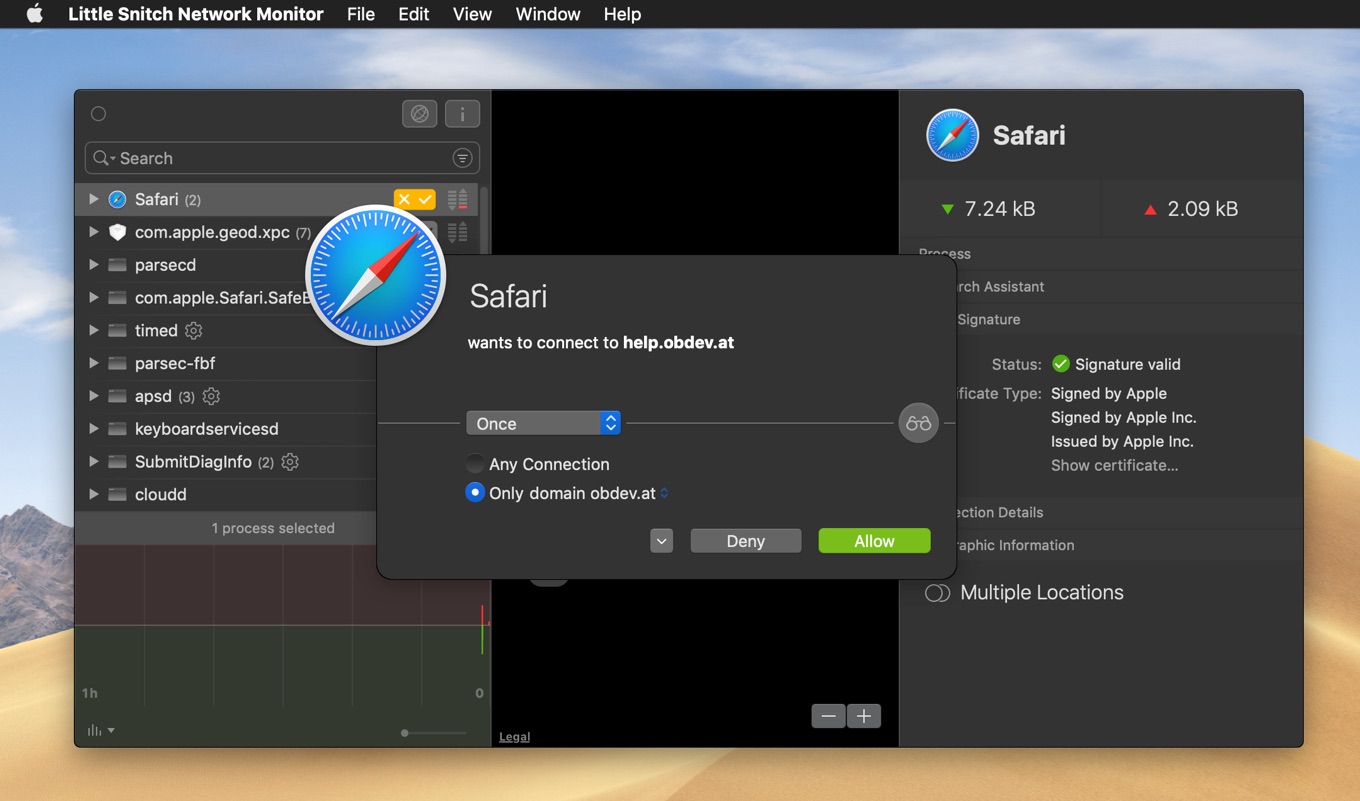| Developer(s) | Objective Development Software GmbH |
|---|---|
| Stable release | 4.5 (March 30, 2020; 18 days ago[1]) [±] |
| Written in | Objective-C |
| Operating system | macOS |
| Available in | German, English, Chinese, Japanese, Russian |
| Type | Firewall |
| License | Proprietary |
| Website | https://obdev.at/products/littlesnitch |
| Usage | |
- Objective Development Little Snitch Game
- Objective Development Software Gmbh Little Snitch
- Objective Development Little Snitch Lyrics
- Objective Development Little Snitch
Jul 10, 2017 Little Snitch, from the maker of the sublime LaunchBar, just got updated with a new Silent Mode that makes the app about a million times better to use, especially the first time you install it. Little Snitch is a host-based application firewall for macOS. It can be used to monitor applications, preventing or permitting them to connect to attached networks through advanced rules. It is produced and maintained by the Austrian firm Objective Development Software GmbH. Unlike a stateful firewall. Objective Development Software GmbH - Feb 22 2011 at 12:19am Copy Link. Store works fine and I just registered successfully the first copy of Little Snitch. I wish that Objective Development will port this app for the Windows platform as well. Thanks, Feb 22 2011 at. Discover powerful applications such as Little Snitch, LaunchBar and Micro Snitch. Products Little Snitch Micro Snitch LaunchBar Internet Access Policy Viewer More Products Blog Shop Support Jobs.
Little Snitch is a host-based application firewall for macOS. It can be used to monitor applications, preventing or permitting them to connect to attached networks through advanced rules. It is produced and maintained by the Austrian firm Objective Development Software GmbH.
Unlike a stateful firewall, which is designed primarily to protect a system from external attacks by restricting inbound traffic, Little Snitch is designed to protect privacy by limiting outbound traffic.[2] Little Snitch controls network traffic by registering kernel extensions through the standard application programming interface (API) provided by Apple.[3]
If an application or process attempts to establish a network connection, Little Snitch prevents the connection. A dialog is presented to the user which allows one to deny or permit the connection on a one-time or permanent basis. The dialog allows one to restrict the parameters of the connection, restricting it to a specific port, protocol or domain. Little Snitch's integral network monitor allows one to see ongoing traffic in real time with domain names and traffic direction displayed.
The application (version 4) received a positive 4.5/5 review from Macworld.[4]
References[edit]
- ^'Release Notes – Little Snitch'. Retrieved March 31, 2020.
- ^'Little Snitch 4'. Retrieved July 20, 2019.
- ^Little Snitch 3 - Documentation. Objective Development Software GmbH. 2013.
- ^Fleishman, Glenn (September 8, 2017). 'Little Snitch 4 review: Mac app excels at monitoring and controlling network activity'. Macworld. Retrieved July 20, 2019.
External links[edit]
- Official website
You probably came here because your Mac showed a message telling you that software from “Objective Development Software GmbH” (Little Snitch) loaded a system extension that will no longer be compatible with a future version of macOS and that you should contact us, the developer, to get more information. Well, here you are.
In order to be able to perform filtering of network traffic, Little Snitch 4 installs a kernel extension (the above mentioned “System Extension”) which is based on Apple’s “Network Kernel Extension” API (NKE).
This API will be deprecated in a future version of macOS and replaced with a new “NetworkExtension” API (NE). Despite their similarity in name, these two APIs work very differently, so the underpinnings of Little Snitch do require a substantial rework.
Will there be an updated version of Little Snitch that is compatible?

Yes. We are going to release an update of Little Snitch that will utilize the compatible replacement APIs.
When will Little Snitch 4 become incompatible?
Objective Development Little Snitch Game

We expect the deprecation to become effective with the next major release of macOS. There’s no official release date from Apple, but based on the release schedule of recent years it will not be before this fall. Little Snitch 4 will then not be loaded by the operating system, but there will still be an option to allow the loading. [1]
Objective Development Software Gmbh Little Snitch
What happens in the unlikely case that no updated version of Little Snitch is available at that time?
We do our best to have an updated version available right in time. But if you’re still concerned – keep in mind that there will be an option in macOS to allow running Little Snitch 4.
If I buy Little Snitch 4 now, will I get the update for free?
Yes. All licenses sold now include a free upgrade to Little Snitch 5. In addition, customers who purchased Little Snitch 4 within a one-year period prior to the final release of Little Snitch 5 (about this fall) will also get a free upgrade. And if you purchased Little Snitch 4 before that period, we will offer you an upgrade at a reduced price.
When will Little Snitch be updated to the new APIs?
Objective Development Little Snitch Lyrics
The replacement APIs that are currently available (NetworkExtension framework on macOS 10.15.4) are not yet completely sufficient to implement the full functionality of Little Snitch. But we are working closely with Apple to fill the remaining gaps and we expect that a beta of the next major macOS version (most likely available at the next WWDC) or even an upcoming version of 10.15 will provide what is missing. As soon as the APIs allow us, we will complete the transition of Little Snitch to the new NetworkExtension API. It’s our goal to provide a public beta in June 2020 and a stable version in October.
Objective Development Little Snitch
The relevant sentence in Apple’s statement to developers is: “Future OS releases will no longer load kernel extensions that use deprecated KPIs by default.” ↩︎